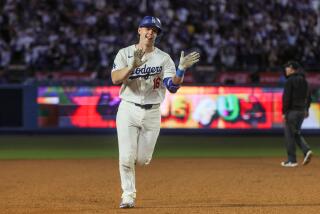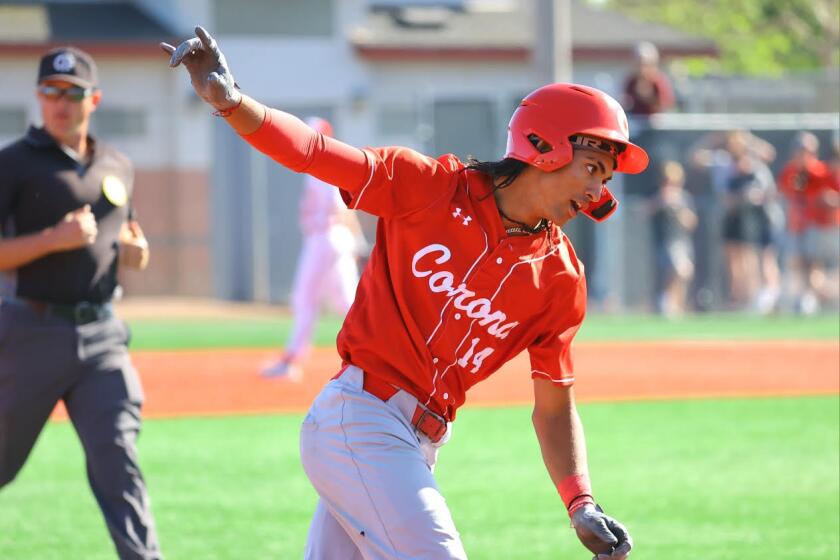Athletes and Illness : Back from the Brink : El Toro’s Smith Keeps Promise After Contracting Rare Vascular Disease
- Share via
LAKE FOREST — That Mark Smith Jr. is leading the El Toro baseball team in home runs is not surprising. That he’s even playing baseball . . . well, that borders on miraculous.
Nearly two years ago, Smith, now 18, contracted a rare disease called Wegener’s Granulomatosis. Doctors weren’t able to diagnose it immediately, and the disease nearly cost him his life.
Wegener’s strikes children and adolescents at the rate of three per 100,000. It causes severe inflammation of the body’s major organ systems--most commonly the lungs, kidneys and sinuses.
“From Day 1, I never thought it would beat me,” Smith said. “I thought I would kick it. My goal was to play baseball again. I’ve always been a baseball player.
Smith made a vow from his hospital bed to El Toro Coach Tom McCaffrey to return for his senior year.
He’s made good on that promise.
“He was so positive he could overcome this no matter what others were saying,” McCaffrey said. “It was probably late February of last year when he said, ‘Coach, I’m going to play again.’ At that time I didn’t believe it. And now, not only to play, but to play well . . .”
Smith is having a terrific season for the 13-4-1 Chargers. In 46 at-bats, Smith has 14 hits (.304) with 15 runs scored. He has four doubles, four stolen bases, three home runs and 17 RBIs.
While battling the disease, Smith, who is 6 feet, 185 pounds, lost 35 pounds and 80% of his muscle tissue. He began his comeback one step at a time, first walking a block and eventually working up to four miles a day. He lifted weights with the team in the morning, and on his own at night--a program he still adheres to.
“The only thing you can observe is when we run hard he gets fatigued and is affected the next day,” McCaffrey said. “But because he’s very intelligent, he controls his situation. I have no trepidation about playing him; he had such a desire to come back, and he was cleared by doctors.”
Talk to Smith, the fourth of six children to Mark Sr. and Artha Smith, and you will never hear him complain that he contracted the disease. It happened, OK. Let’s move on.
“I believe that, even if it sounds trite, it’s important that people take advantage of the opportunities they have so there are no regrets if they didn’t do something,” Smith said. “If I had not played, I would have always regretted it. Playing was my statement that I wasn’t going to get beat by something, that I wouldn’t give up.”
In December, 1994, however, Smith needed more than a positive attitude. He needed answers.
It started with chest pains on Christmas Day. Over the next four days and despite several doctor visits (each time he was told he had a virus), Smith grew so weak that when his family tried to take him to the hospital, Mark Sr. recalled his son “could only take three to four steps then crumple to the ground.”
X-rays and a CAT scan on Dec. 29 revealed tumors in Smith’s chest, lungs, kidneys, spine, sinuses and liver. The family was told Smith might have cancer.
“We didn’t know what to do,” said Mark Sr., an attorney. “As a parent, to be totally out of control over what’s being done to your child is a terrible feeling.”
That day Smith underwent the first of six surgeries at St. Joseph Hospital in Orange. Because the doctors still thought his condition was a spreading cancer, they tried to find where it originated. They began their search in the groin area (testicular cancer is a common cancer among teenage boys), but that proved negative.
Biopsies were then performed on Smith’s kidneys, bladder, both hips and lungs. Bone marrow was also drawn for testing.
On New Year’s Eve a specialist was called in to examine the X-rays. That surgeon, Mark Sr. said, told the family that Smith did indeed have cancer--lung cancer--and “that there was no hope.”
Later that day, upon further examination of lung tissue by the hospital’s pathology department, the tumors were determined to be free of cancer.
On Jan. 3, 1995, Dr. Deborah McCurdy, a rheumatologist at Children’s Hospital of Orange County, was one of the physicians who met with the Smith family to confirm that Mark Jr. did not have cancer. The family was relieved, but Mark Sr. wondered why the doctors remained stone-faced.
McCurdy, who is one of Smith’s regular physicians along with Louise Sanematsu and Christy Sandborg, then told the family about Wegener’s Granulomatosis.
“This is not a cancer, but it can be fatal,” McCurdy said, adding she has seen “maybe three or four cases” in the county in the last five years.
“It’s OK if an injury leaves a scar on the skin, but you don’t want scarring on vital organs. Being a vascular disease, it can cause severe inflammation in the blood vessels, causing them to break and bleed in the lungs. Mark wasn’t coughing up blood, but there was evidence of bleeding in the lungs when he came in for treatment.”
Although there is no known cure, the disease can go into remission if treated. Untreated, it can cause death in less than a year.
Mark Sr., still not convinced of what was ailing his son, had CHOC send tissue samples to UCLA, the Mayo Clinic in Rochester, Minn., and the Institute of London. Once satisfied that Wegener’s was the right diagnosis, it was time to start arresting the disease.
Along with exercise, Smith takes two oral medications designed to reduce inflammation by suppressing the body’s immune system. Because there is no known cure for Wegener’s, there is no timetable for Smith to stop taking them.
“Something causes an immune system to respond,” McCurdy said. “When there is an infection or virus, the body tries to localize it. When that happens, the infection is calmed.
“But with [Wegener’s] there is some constant stimulus; the body cannot turn off the inflammations used to fight disease and infection. The body’s response is too great and goes on too long.”
There are dangerous side effects, however. Both drugs lower the count of the body’s white blood cells, the cells that keep the immune system working. That makes the patient more vulnerable to common infections and viruses.
It’s one reason McCurdy was reluctant to clear Smith to play baseball. Even though Smith worked himself into playing shape, he has had one brief relapse of chest pains. And once a month he is scheduled to be hospitalized for three days to take his medication intravenously.
“From a medical standpoint, I have concerns,” McCurdy said. “If he’s injured, it would tend to be more severe than others because his immune system is down. And he can get extremely tired. School is enough, but school and baseball is a very big schedule.
“On the other hand, people have to do what they are destined to do. Baseball is a very important part of who Mark Smith is, so he has the right to do it.”
Smith played on El Toro’s summer league team. He also attended a baseball camp at Brigham Young, where he caught the attention of Coach Gary Pullins’ staff. Smith has been accepted at BYU and the school is considering him for a partial athletic scholarship.
“We see him as a player who needs time to develop,” Pullins said, “but he’s a great student and tenacious in his work habits. Everything, with exception of health, points to a positive projection.
“We’re not talking a sore elbow here. This is such a rare ailment, but rule out the illness and we think he can become a very good player. We hope the opportunity to play on our team will contribute to his well-being.”
From Smith’s perspective, he already has won.
“Being positive is the only way to deal with it. If I was negative, it only gets worse,” he said. “I decided it would take something phenomenal to keep me from doing something I love, and this disease wasn’t it.”
More to Read
Get our high school sports newsletter
Prep Rally is devoted to the SoCal high school sports experience, bringing you scores, stories and a behind-the-scenes look at what makes prep sports so popular.
You may occasionally receive promotional content from the Los Angeles Times.






